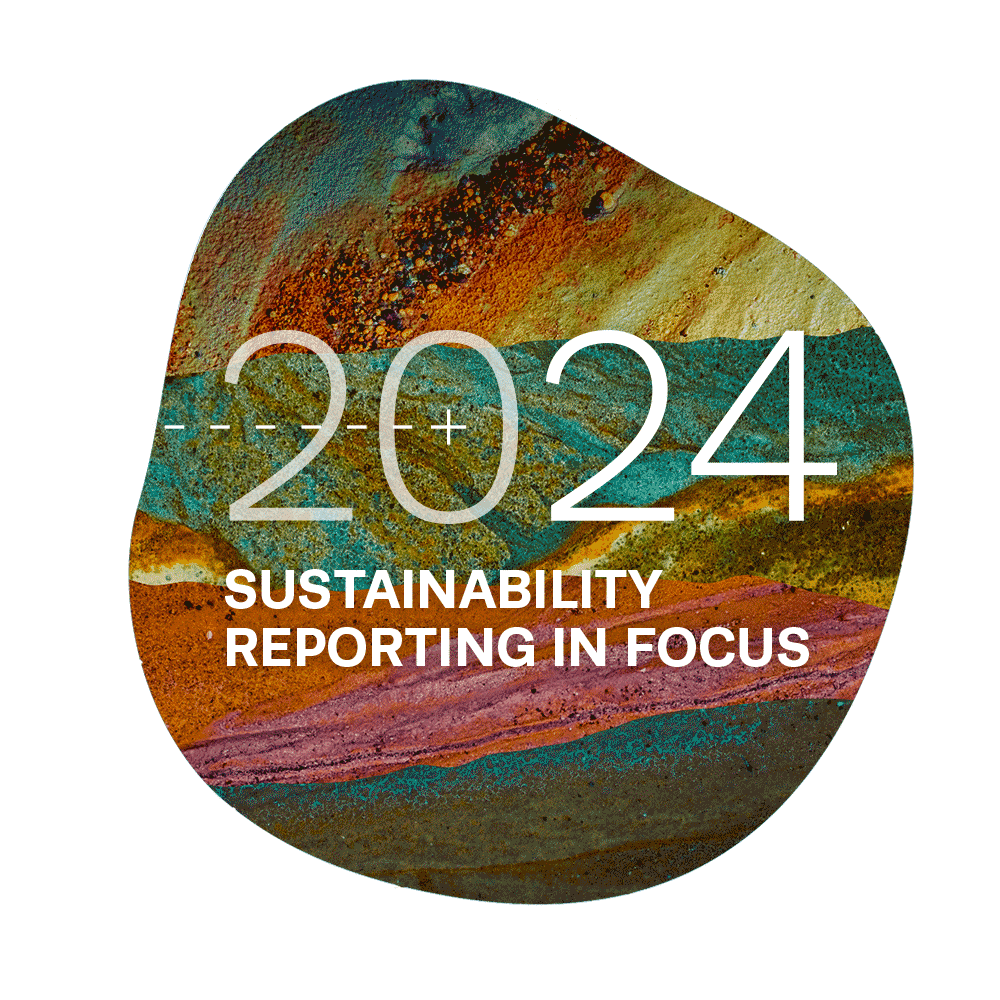This website uses cookies so that we can provide you with the best user experience possible. Cookie information is stored in your browser and performs functions such as recognising you when you return to our website and helping our team to understand which sections of the website you find most interesting and useful.
G&A’s 2024 Trends Report: The Few Remaining Non-Participants in ESG Reporting
Posted on January 6, 2025 by Christina Carlton
#Business & Society #Corporate Sustainability Reporting #G&A Institute #Sustainability Big Data #Sustainability Reporting
By Christina Carlton, Senior Sustainability Analyst – G&A Institute
The demand for corporate sustainability information rises each year, with companies fielding increasingly frequent and detailed requests from customers, employees, investors, and regulators. The latest trends report by G&A Institute, published in September, shows that most Russell 1000® companies are meeting that demand.
Compiling thousands of data points, G&A’s 2024 Sustainability Reporting in Focus Report examines trends in sustainability reporting among companies on the Russell 1000 Index. Our analysis shows that 93% of Russell 1000 companies published sustainability reports and/or disclosures in 2023. This is an astounding level of reporting among a group of businesses that represents the largest publicly traded U.S. companies.
As of our latest research, only 7% of companies on the list do not publish any sustainability information either through formal reports or through informal disclosure on their website. What explains their non-participation to date, and might anything change their future reporting behavior?
Explaining the Non-Reporters
When we traced the data collected on the 2023 non-reporting companies, a few themes about sustainability reporting behavior emerged:
- Most non-reporting companies are within the smaller half of the Russell 1000 Index®
Looking at the rates of sustainability reporting among the Russell 1000 companies, there is a stark contrast between the largest companies – those represented in the S&P 500® (which is the top half of the Russell 1000) – and the smaller but still substantial companies making up the rest of the Russell 1000 Index. Rates of reporting within the largest companies are quickly approaching 100%. It is primarily the smaller companies that have not yet begun reporting sustainability information: 90% of non-reporters are in the smaller half of the Russell 1000.
The finding suggests that the increased resources held by larger companies have allowed them to focus more attention on sustainability matters. It also suggests that larger corporations may face more pressure from stakeholders to report on their sustainability efforts.
| Top Half of Russell 1000® | Bottom Half of Russell 1000® | Total Russell 1000® | |
| Total % Reporters | 99% | 87% | 93% |
| Total % Non-Reporters | 1% | 13% | 7% |
- Among non-reporting companies, there is a wide variance in reporting rates by sector
| Top Half of Russell 1000® (S&P 500®) | |||||||||||
| Communication | Consumer Discretionary | Consumer Staples | Energy | Financials | Health Care | Industrials | Information Technology | Materials | Real Estate | Utilities | |
| Total Companies | 19 | 53 | 37 | 23 | 72 | 64 | 78 | 61 | 28 | 31 | 30 |
| Total Non-Reporters
|
2 | 1 | 1 | 0 | 2 | 1 | 0 | 0 | 0 | 0 | 0 |
| Percentage of Non-Reporters | 11% | 2% | 3% | 0% | 3% | 2% | 0% | 0% | 0% | 0% | 0% |
| Bottom Half of Russell 1000® | |||||||||||
| Communication | Consumer Discretionary | Consumer Staples | Energy | Financials | Health Care | Industrials | Information Technology | Materials | Real Estate | Utilities | |
| Total Companies | 22 | 72 | 22 | 13 | 84 | 54 | 87 | 72 | 30 | 32 | 10 |
| Total Non-Reporters
|
8 | 11 | 5 | 1 | 14 | 11 | 8 | 8 | 0 | 1 | 0 |
| Percentage of Non-Reporters | 36% | 15% | 23% | 8% | 17% | 20% | 9% | 11% | 0% | 3% | 0% |
Within the top half of the Russell 1000, Communication was the sole outlying sector with a double-digit percentage of non-reporters. This trend is also reflected in the smaller half of the Russell 1000 – the Communication sector had the highest level of non-reporters at 36%. In every sector, non-reporting levels were much higher in the smaller half of the Russell 1000 than in the larger half.
On the other end of the spectrum, every company in the Materials and Utilities sectors reported sustainability information in 2023. These sectors tend to have greater direct environmental impacts, and this finding perhaps points to the role that environmental regulations play in driving more sustainable corporate behaviors.
- 34% of non-reporters had no sustainability reporting or data referenced anywhere on their websites
G&A’s research uses the label “non-reporters” to refer to companies that reported no sustainability information through any means during the reporting period of 2023. Companies can report in a variety of ways including through:
- Formal reporting which may include sustainability frameworks such as GRI, SASB, TCFD, and SDGs (future trends reporting to include ESRS, ISSB, and TNFD)
- Responding to sustainability questionnaires such as CDP
- Including sustainability information on the company’s website – must have at least two environmental or social data points with at least two years of comparable data
Even among companies meeting this definition of non-reporter, there is still some variance which is discussed further in the following points. However, a substantial portion of non-reporters (34%) simply do not report, reference, or suggest any awareness of sustainability issues. Reasons for this gap could be lack of company resources, no buy-in from senior leadership, or no demand from investors, customers, or other stakeholders.
- 12% of non-reporters published sustainability reports previously
A known fact to any professional or company steeped in the world of sustainability is that addressing ESG-related issues, creating targets/goals, evaluating your impact, and reporting on it can all be quite difficult. This discovery could be the reason some companies have attempted initial sustainability reporting in the past but have not continued to do so on an annual basis. Like the 34% of companies without any sustainability references at all, these companies may have hit walls with not enough resources (both financial and talent) or lack of senior leadership buy-in. If they are operating in an environment with little external or internal stakeholder pressure to act, then they have little incentive to incorporate sustainability considerations into their business strategy.
As mandated sustainability reporting becomes more prevalent, we may see these companies taking up the sustainability challenge again.
- 5% of non-reporters referenced sustainability reporting by a subsidiary
A handful of non-reporters that are parent companies referenced sustainability reporting completed by a subsidiary. While this shows awareness of sustainability activities underway within the group, it fails to set a consistent benchmark for sustainability performance for the company as a whole.
This approach may also prove cumbersome or inadequate. For example, companies within scope of the California Climate Disclosure Rules have the option to report GHG emissions at the parent level rather than requiring each subsidiary to report individually. This can help reduce some of the reporting burden and streamline the approach for the entire group.
Additionally, referring to subsidiary reporting will not be sufficient if any of these companies are subject to reporting under the EU’s Corporate Sustainability Reporting Directive (CSRD). Per the CSRD requirements, companies outside the EU but within the scope of CSRD will have to report at the parent level of the company beginning in 2029 (see G&A’s CSRD Requirements for Non-EU Companies resource paper for more information on this topic).
- 14% of 2023 non-reporters published an inaugural sustainability report in 2024
In addition to our 2023 focused research, we also looked at the non-reporters’ behavior thus far in 2024 and found that several of them launched their first sustainability reports in 2024. This should come as no surprise since sustainability reporting continues to rise with each passing year (see G&A’s Sustainability Reporting Trends research for trends over time).
Provided they are listed on the Russell 1000 Index in 2024, we will count these companies as sustainability reporters within G&A’s analysis of the 2024 reporting period.
- 27% of non-reporters included some sustainability-related policies or initiatives on their websites
In another promising sign of increasing awareness of sustainability issues among corporations, many companies have included at least some sustainability-related information on their websites, even if it does not rise to the level of year-over-year comparable data. The types of information varied widely and included descriptions of social impact initiatives, statements of commitment to begin reporting in 2024/2025, general environmental practices, and specific environmental, social, and/or governance policies.
None of the information qualified as comprehensive sustainability reporting, but it signals initial steps towards more robust incorporation of sustainability practices for these businesses.
- 8% of non-reporters were companies that formed during the 2023 reporting period
Is it fair to call a newly formed company a “non-reporter”? Perhaps not. Realistically, it may take a few years for these companies to establish the right teams, put in place data collection processes, and evaluate their sustainability-related impacts, risks, and opportunities. If this describes your company and you are seeking support for the early stages of your sustainability initiatives, our team would love to hear from you. You can get in touch here.
Looking Ahead
Pressure is growing on companies from two major directions: mandatory sustainability reporting is becoming more prevalent for large companies that operate internationally; and investors, customers, and communities continue to press companies to manage and reduce their sustainability-related impacts, particularly when it comes to climate.
As the global community continues to grapple with the harsh and compounding effects of climate change, biodiversity loss, air/water/soil degradation, and out of-control volumes of waste, we do not expect the pressure on companies to lessen. On the contrary, we expect to see a continued push for companies to implement sustainability initiatives, targets, and goals and to report on their progress.
A look at companies that are not formally reporting sustainability information shows that even within this group, the trend towards more sustainability reporting holds. It is important to overcome barriers for non-reporters as we work towards a world where businesses both create value and help ensure that future generations can do the same.

ABOUT THE AUTHOR
Christina Carlton – Senior Sustainability Analyst, G&A Institute
Christina Carlton is a Senior Sustainability Analyst at G&A Institute. Her role includes supporting client needs through ESG data analysis, peer benchmarking, and sustainability trend research. She enjoys helping companies work towards comprehensive and meaningful ESG disclosures.


